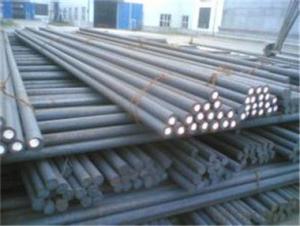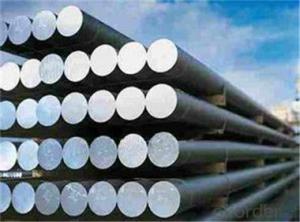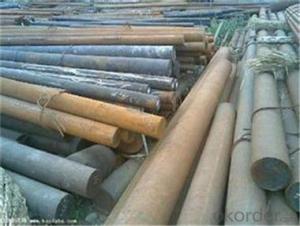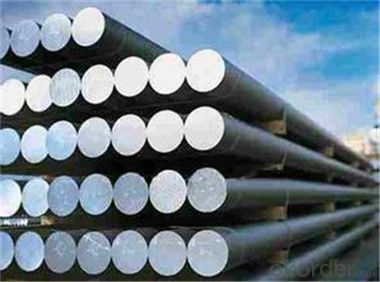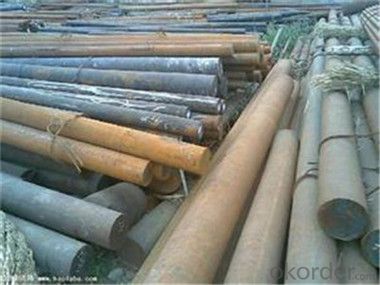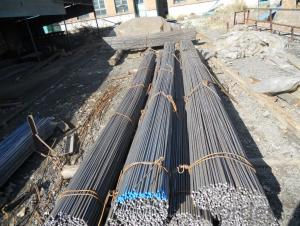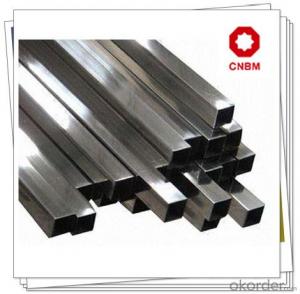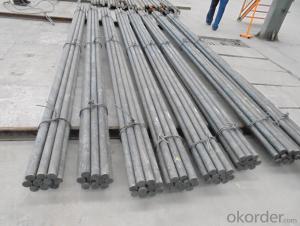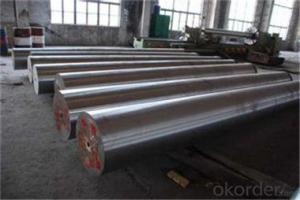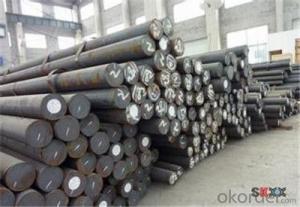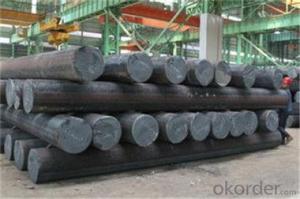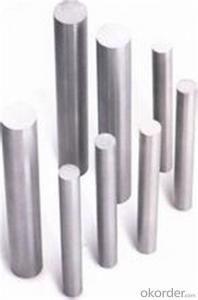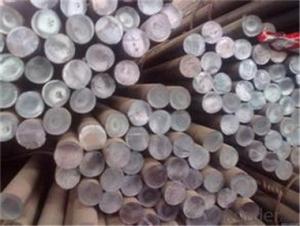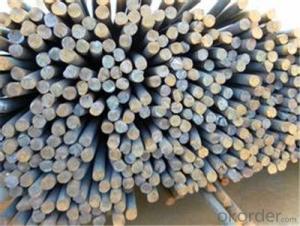Steel Round Bar Reliable manufacturer in China
- Loading Port:
- Tianjin
- Payment Terms:
- TT OR LC
- Min Order Qty:
- 400 m.t.
- Supply Capability:
- 2000000 m.t./month
OKorder Service Pledge
OKorder Financial Service
You Might Also Like
Description of steel round bar:
1. Commodity: Round steel bar
2. Technical: Hot rolling
3. Length: Min. 5.8meter, according to requirement.
Festures of steel round bar:
1.Dia 80-800mm Length:2000-13000mm or as required
2.Technique:Forged
3.Delivery Time:45 days
Specifications of steel round bar:
1. Standards: AISI 4340 8620 8640 4320 , JIS SNCM8 GB:40CrNiMoA
2. Specification: Dia: 80~450mm Length:2000-13000mm or as required
3. Process: EAF+LF+VD ( necessary) UT+ Peeled +Turned + Heat Treatment (optional).Providing complete services from manufacturing and marketing to distributing;Steel exported all over the world;
4. Chemical Composition (%):
C | Si | Mn | S | P | Cr | Ni | Cu | Mo |
0.37-0.44 | 0.17-0.37 | 0.40-0.80 | 0.025(max) | 0.025(max) | 0.60-0.90 | 1.25-1.65 | 0.025(max) | 0.15-0.25 |
Images of steel round bar:
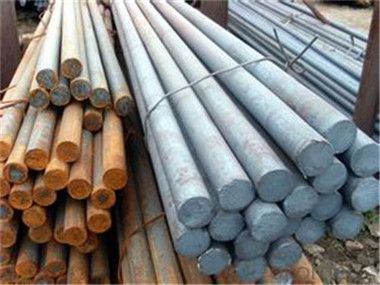
FAQ:
1. What is your package?
Packing situation: standard seaworthy packing or as customer required.
2. How long is the lead time?
Delivery time: 45 days after order confirmed.
3. What payment term do you accept?
Payment: T/T or L/C at sight.
- Q: Can steel round bars be used for making gears or sprockets?
- Gears or sprockets can indeed be made using steel round bars. Steel is widely employed in the manufacturing of gears and sprockets due to its exceptional strength, durability, and resistance to wear and tear. Steel round bars can be shaped through machining or forging and then further modified by cutting, drilling, or milling to create the necessary teeth or grooves for gear or sprocket functionality. The selection of the specific type of steel and its heat treatment can be based on the application requirements, such as load capacity, speed, and environmental conditions. All in all, steel round bars offer a versatile and dependable option for the production of gears and sprockets.
- Q: Can steel round bars be used for making shafts?
- Yes, steel round bars can be used for making shafts. Steel round bars are commonly used for their strength, durability, and machinability, making them suitable for shaft applications in various industries such as automotive, construction, and manufacturing.
- Q: Are steel round bars resistant to chemicals?
- The resistance of steel round bars to chemicals can vary depending on the specific steel type and the chemicals involved. Stainless steel round bars are well-known for their exceptional resistance to a wide range of chemicals, including acids, alkalis, and various organic compounds. This is because stainless steel contains high levels of chromium, which creates a protective oxide layer on the surface, preventing corrosion and chemical attacks. However, not all steel round bars possess the same level of chemical resistance. Carbon steel round bars, for example, are more prone to corrosion and chemical attacks compared to stainless steel. Corrosive chemicals, especially in highly corrosive environments, can affect carbon steel and cause damage. In such cases, it may be necessary to use additional protective measures, such as coatings or treatments, to enhance the chemical resistance. To summarize, stainless steel round bars provide excellent chemical resistance, whereas carbon steel round bars may require extra precautions to prevent chemical corrosion. When assessing the chemical resistance of steel round bars, it is crucial to consider the specific steel type, the type of chemical, and the environmental conditions.
- Q: Can steel round bars be used in corrosive environments?
- The suitability of steel round bars in corrosive environments depends on the specific type of steel and the severity of the corrosion. For instance, stainless steel round bars are well-known for their excellent resistance to corrosion and are widely used in corrosive environments like marine applications, chemical processing plants, and wastewater treatment facilities. These bars are typically alloyed with elements such as chromium and nickel, which create a protective layer on the surface of the steel, preventing corrosion. On the other hand, carbon steel round bars are more susceptible to corrosion and may not be appropriate for highly corrosive environments unless they are properly coated or treated. In such situations, it is crucial to seek advice from experts or engineers to select the right steel grade and take necessary precautions to ensure the durability and performance of steel round bars in corrosive environments.
- Q: What is the difference between a turned and a polished steel round bar?
- A turned steel round bar is machined to achieve a specific diameter and surface finish, while a polished steel round bar undergoes additional processing to enhance its surface smoothness and appearance.
- Q: What are the different types of surface treatments for steel round bars?
- There are several types of surface treatments commonly used for steel round bars. These include hot-dip galvanizing, electroplating, painting, powder coating, and black oxide coating. Each treatment offers specific benefits and is chosen based on the desired level of corrosion resistance, aesthetics, and durability required for the application.
- Q: How are steel round bars priced?
- Steel round bars are typically priced based on several factors. One of the key factors is the cost of raw materials, which includes the cost of steel billets or ingots used to produce the round bars. The price of these raw materials can fluctuate based on market conditions, such as supply and demand dynamics and changes in input costs. Another factor that influences the pricing of steel round bars is the manufacturing process involved. The cost of transforming raw materials into finished round bars includes expenses such as energy consumption, labor costs, and equipment maintenance. These costs can vary depending on the complexity of the manufacturing process and the efficiency of the production facilities. Market conditions also play a significant role in determining the pricing of steel round bars. Factors such as global economic trends, industry demand, and competition among suppliers can impact the market price. If there is high demand for steel round bars, manufacturers may be able to charge a premium price. Conversely, during periods of oversupply, prices may be lower as suppliers compete for customers. Additionally, the size, grade, and quality of the steel round bars can affect the pricing. Larger diameter bars or specialty grades that require additional processing steps or high-quality raw materials may be priced higher than standard sizes or lower-grade bars. Finally, transportation costs and logistics can also influence the pricing of steel round bars. Shipping distances, freight rates, and any additional handling fees can add to the overall cost of the product. In summary, the pricing of steel round bars is influenced by the cost of raw materials, the manufacturing process, market conditions, the size and grade of the bars, and transportation costs. Understanding these factors can help buyers and sellers negotiate fair prices for steel round bars.
- Q: Can steel round bars be used as axles or shafts?
- Yes, steel round bars can be used as axles or shafts. Steel is a commonly used material for axles and shafts due to its high strength and durability. Steel round bars are particularly suitable for applications requiring rotational motion, such as axles and shafts, as they can handle heavy loads and withstand bending and torsional forces. Additionally, steel round bars can be machined and heat-treated to meet specific requirements for hardness and surface finish, further enhancing their suitability as axles or shafts. Overall, steel round bars are a reliable and widely used choice for axles and shafts in various industries, including automotive, machinery, and construction.
- Q: What are the different grades of steel used for round bars?
- There are several different grades of steel commonly used for round bars, including low carbon steel, medium carbon steel, and alloy steel. Each grade has its own unique properties and is suited for specific applications based on factors such as strength, durability, and corrosion resistance.
- Q: What is the weight of a steel round bar?
- The weight of a steel round bar depends on its dimensions, specifically its diameter and length. To calculate the weight, you can use the formula: weight = volume × density. To find the volume of the steel round bar, you can use the formula for the volume of a cylinder: volume = π × (diameter/2)^2 × length, where π is a mathematical constant approximately equal to 3.14159. The density of steel varies depending on the type and grade, but it is typically around 7.85 grams per cubic centimeter (g/cm³) or 7850 kilograms per cubic meter (kg/m³). By substituting the appropriate values into the formula, you can calculate the weight of the steel round bar in the desired unit (grams, kilograms, pounds, etc.).
Send your message to us
Steel Round Bar Reliable manufacturer in China
- Loading Port:
- Tianjin
- Payment Terms:
- TT OR LC
- Min Order Qty:
- 400 m.t.
- Supply Capability:
- 2000000 m.t./month
OKorder Service Pledge
OKorder Financial Service
Similar products
Hot products
Hot Searches
Related keywords
